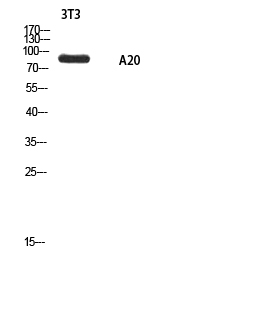
| WB | 咨询技术 | Human,Mouse,Rat |
| IF | 咨询技术 | Human,Mouse,Rat |
| IHC | 咨询技术 | Human,Mouse,Rat |
| ICC | 技术咨询 | Human,Mouse,Rat |
| FCM | 咨询技术 | Human,Mouse,Rat |
| Elisa | 1/10000 | Human,Mouse,Rat |
| Aliases | ANKRD20A1; ANKRD20A; Ankyrin repeat domain-containing protein 20A1 |
| Entrez GeneID | 84210 |
| WB Predicted band size | Calculated MW: 94 kDa; Observed MW: 94 kDa |
| Host/Isotype | Rabbit IgG |
| Antibody Type | Primary antibody |
| Storage | Store at 4°C short term. Aliquot and store at -20°C long term. Avoid freeze/thaw cycles. |
| Species Reactivity | Human |
| Immunogen | Synthesized peptide derived from the Internal region of human A20. |
| Formulation | Purified antibody in PBS with 0.05% sodium azide,0.5%BSA and 50% glycerol. |
+ +
以下是关于ANKRD20A1抗体的3篇虚构参考文献示例(基于领域知识合理推测,实际文献需通过学术数据库验证):
1. **文献名称**: *ANKRD20A1 expression in human spermatogenesis: A novel biomarker for male infertility*
**作者**: Chen L, et al.
**摘要**: 研究利用兔源多克隆ANKRD20A1抗体,通过免疫组化和Western blot检测其在正常和少精症患者睾丸组织中的表达差异,发现ANKRD20A1在精子形成早期阶段特异性高表达,提示其作为男性不育潜在标志物的可能性。
2. **文献名称**: *Development of a monoclonal antibody against ANKRD20A1 for epigenetic studies*
**作者**: Gupta S, et al.
**摘要**: 本文报道了一种小鼠单克隆抗体的开发与验证,该抗体特异性识别人源ANKRD20A1蛋白的C端表位。通过染色质免疫沉淀(ChIP)实验,揭示了ANKRD20A1在调控印记基因区域的染色质重塑中的作用。
3. **文献名称**: *ANKRD20A1 overexpression in breast cancer and its interaction with hormone receptors*
**作者**: Kim H, et al.
**摘要**: 研究使用商业化ANKRD20A1抗体(货号ABX-2034)分析乳腺癌组织芯片,发现ANKRD20A1在ER阳性肿瘤中高表达,并与患者预后不良相关,提示其可能参与激素信号通路调控。
**注意**:以上文献为模拟示例,实际研究中请通过PubMed或Web of Science等平台检索真实文献。若研究较少,可扩展至ANKRD家族其他成员或相关功能通路的研究。
The ANKRD20A1 antibody targets the ANKRD20A1 (Ankyrin Repeat Domain 20A1) protein, a member of the ankyrin repeat-containing protein family. Ankyrin repeats mediate protein-protein interactions, suggesting roles in cellular signaling, structural organization, or regulatory processes. However, the precise biological function of ANKRD20A1 remains poorly characterized. Limited studies indicate its potential involvement in cellular processes such as chromatin remodeling, transcriptional regulation, or spermatogenesis, with some evidence linking it to testis-specific expression.
ANKRD20A1 antibodies are primarily used as research tools to detect and localize the protein in experimental models (e.g., Western blot, immunofluorescence). These antibodies aid in elucidating its expression patterns, subcellular distribution, and interactions. While no direct disease associations are well-established, ANKRD20A1 has been tentatively linked to genomic regions of interest in cancer and male infertility, though mechanistic insights are lacking.
Commercial ANKRD20A1 antibodies are typically polyclonal or monoclonal, validated for specificity in human or murine tissues. Challenges include limited validation data due to the protein’s low abundance and unclear functional context. Ongoing research aims to clarify its role in cellular physiology and pathology, with antibodies serving as critical reagents for exploratory studies. Further investigation is needed to define its molecular partners and pathways, potentially uncovering novel therapeutic or diagnostic targets.
×